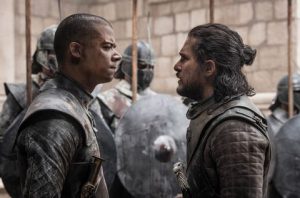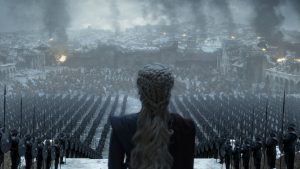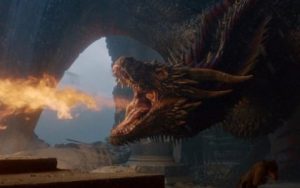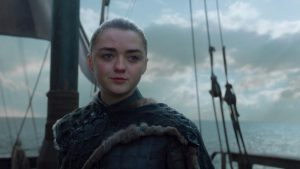Game of Thrones 8 – Finale – Stoppage.
After 8 years of complex and well-told stories, with characters that have impressed and captivated the audience, the series ends with sequences of illogical events that lead to an uninspired and no longer complex and interestingly told stoppage.
The first 30 minutes of the final episode were a consistent and likely continuation of the previous episode. The figure of Tyrion (Peter Dinklage) sets off in search of his siblings and is shocked by their death. Jon-Aegon (Kit Harrington) tries to prevent last mad acts in the destroyed city, but he did not succeed because he does not reveal his true identity. The figure of Grey Worm (Jacob Anderson), on the other hand, has blindly adopted his queen’s madness and one of those who has given up his identity carries out her orders mercilessly as a No-One.
Daenerys (Emilia Clarke) continues to show her true character traits as a fascist commander who calls for a ‚total war‘. Where do the many Unsullied and Dothraki fighters suddenly come from in such flocks, after being considerably decimated in both previous battles?
The figure of the Tyrion gets a little honor back when he dares to quit as the hand of the queen. Arrested and incarcerated, he can convince Jon-Aegon that the only rescue – for himself and Westeros – can come from him by keeping Daenerys from further mad deeds that would also hit him, Jon, and his sisters. No sooner said than done. Jon-Aegon stabs the mass murderer, amazingly still beloved by him. The fact that the dragon child notices this immediately and approaches it, also lies just in the logic of the previous narrative. Also, that he does not murder Jon-Aegon, but lets the throne melt away, can be believed just yet, within the logic of the previous narrative. So far so good. But then we experience a radical change in the quality of the dramaturgy, like the narrative.
From this moment on, illogical sequences of events meet a persiflage of the previous series.
The dramaturge first wonders how Grey Worm and everyone else knew that Jon-Aegon had stabbed Daenerys. There was nobody there and the dragon flew with her into the far distance before anyone could see her being murdered with their own eyes. Did Jon tell everyone what he did? Why should he? So, how does Jon get into the dungeon, and that without objection of any of the others from those characters still alive? Got Grey Worm so powerful that no one could stand up to him and stop him from threatening Jon with the death penalty? Unlikely, in the sense of the story as it got told so far. Has Arya suddenly lost all her abilities or for whatever reason has given up her trust and hopes in the brother who is now a cousin? The Arya from the episodes before would have been able to free him, for example.
Then, when it comes to appointing the new king, everyone, including Sam (John Bradley) and Bran (Isaak Hempstead Wright), have forgotten that Jon would be the rightful heir to the throne, although until a few minutes earlier everyone still assumed that he should be the one and only king of Westeros, and both did everything they could to make him and others aware of it. What happened to them? Do they resent his love for Daenerys? But he separated from her in the most drastic way imaginable. This ending presented in the last hour of the series is therefore also illogical, in the sense of the previous action. Even Tyrion has forgotten this fact, which just saved his life because he would have been cremated by the dragon by now, and now suggests Bran be the new king and Jon to stay prisoner, why? Because of the knowledge that he gathered through his spiritual abilities? If so, Sam could have been king there too. And why is Sam suddenly wearing a monk’s robe?
Who quickly rebuilt the hall that had just been destroyed and who repaired the chairs in no time in which the king’s advisers now sit together?
It is completely absurd, dramaturgically seen, that Jon returns to Castle Black, and welcomed there by Tormund Giantsbane (Kristofer Hivju) and then Jon rides further north with his old buddy, fishing and hunting? To enjoy the life as buddies?
The decision for the figure of Arya can be interpreted a little bit more positive and consistent because she got developed into a person who does not fit into the moral concept of this Westeros, behaves against the rules and carries the only blink of a reflection of feminism within the series. To move on corresponds to the activities of this character as they were shown in the course of the action. In this sense, her journey beyond the borders known so far represents a consequent end when Westeros is placed in the hands of an asexual spiritual leader who is balanced with men who are devoted to alcohol and enjoying to spend time with prostitutes, with one who is allowed to wear a monk’s robe despite having a family, and a deceived woman who nevertheless worships her lover.
Bran, the new king, prefers to go for spiritual hunting the dragon instead of discussing the matters of reconstructing and consolidating the kingdom after these disastrous events?
So much narrative effort, with gods, Satan, choice, secrets, family ties, but at the end we must listen to a discussion about the reconstruction of brothels; and that Jon is changed and not presented accepting to be not Aegon after all and although he did a few episodes back in the family crypt, but in the heartache suddenly mutated into a character who doesn’t care about anybody else? So many lives/characters sacrificed to get him, the chosen one, at the throne, and then he gets shown to have decided for fishing.
Dramaturgically speaking, this end makes little sense – in my view – except that it could in principle allow HBO the option of a sequel. From a dramaturgical point of view, this end has little to do with the plot told for over 85 hours or more. And an ingenious and surprising postmodern twist on declaring everything to be the author’s dream or imagination this end does not offer either, although the series has operated to some extent with the aesthetics of postmodern cinema. But also in postmodern movies, there is a logic in presenting such a twist, which gets prepared long before it happens, due to the fundamental rules of film dramaturgy.
A good ending is crucial. In film dramaturgy, everything is composed to drive towards the ending; and to achieve this requires a well-woven story, that is within the framework of the conventions one set for the plot as logical as possible and presenting a probably evolving progressive chain of events. In a film, unlike to a novel, the ending must be a consequence resulting from the course of the plot. The rules of the literary narrative are a little different from those of film drama, which has its roots in theatre and performing narrative. A cinematic narrative is bound to a time-space continuum, it is perceived by the audience at the moment. The film is ‚time-based‘, therefore the dramaturgy for an observing audience must be organised in such a way that the events result in an interplay of family structures and surprising twists and turns or a surprising arrangement, as well as a logical and probable development within the framework of the cosmos, presented and its rules. The crux here is that the last hour of this series does not correspond to the conventions of the imagined cosmos in which the action takes place; and thus is not in the least logical and probably a result of the action. This disappoints the really large fan-audience as well as the few academics who have followed this series with interest. This also reduces the chance for a successful sequel, as the disappointed fans will now hardly hope for a continuation.
While the „Game-of-Thrones-Dramaturgy“ has so far been spoken of with admiration, this final episode has also destroyed this enthusiasm. There are three possible theories for understanding or interpreting this end: Maybe it was the concession of the serial makers to an end, which was perhaps decided by RR Martin? That he is the less talented narrator, who weaves in many ideas, religious and occult sparkles as references like hints, but who is not always able to organise the narrative strands in an interesting way, which can easily be understood when comparing the novels to the first seasons of the series. Or was it just trying to get rid of the fans? Or, however, the authors of the series have gone upside down and wanted to create a more modern end (in sense of diversity, with the man in the wheelchair and the small adult plus all outcasts, that make it to the top jobs by scarifying the one who is most outcast of them all and designed in the tradition of the Western genre?) than their previous narrative allows. or, this is a much more speculative and – my apologies – ironic one, is it a try to reflect on contemporary politics, to see misogynists and a spiritual character who might be a reference to a TV character as the new heads of politics.
Kerstin Stutterheim
Selected bibliography for further reading:
ECO, U. 1977. The Open Work of Art, Frankfurt am Main, Suhrkamp.
KLOTZ, V. 1980. Closed and open form in drama (1969), Munich, C. Hanser.
KLOTZ, V. 1998: The dramaturgy of the audience: How stage and audience interact, especially with Raimund, Büchner, Wedekind, Horváth, Gatti and in political agitation theatre, Würzburg, Königshausen and Neumann.
RANCIÈRE, J. 2006 The aesthetic unconscious, Zurich [et al.], Diaphanes.
RANCIÈRE, J. 2011. The emancipated spectator, London, Verso.
STUTTERHEIM, K. 2015. Handbook of applied dramaturgy. Vom Geheimnis des filmischen Erzählens, Frankfurt am Main et al., Peter Lang Verlag.
STUTTERHEIM, K. 2019. Modern Film Dramaturgy, London and New York, Routledge.
STUTTERHEIM, K. & LANG, C. 2013. Come and play with us Dramaturgie und Ästhetik im postmodernen Kino, Marburg, Schüren.




